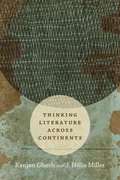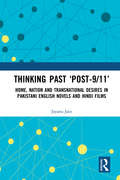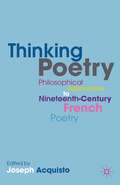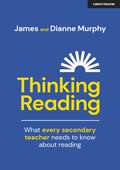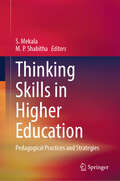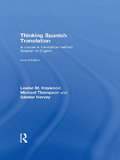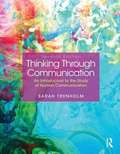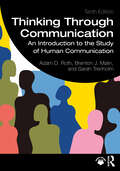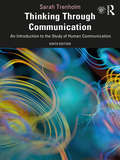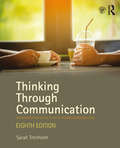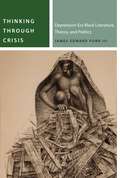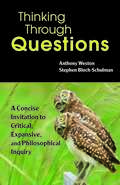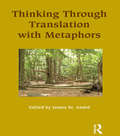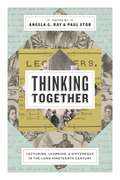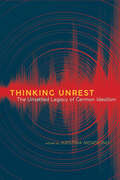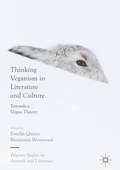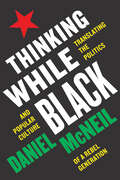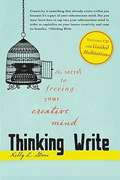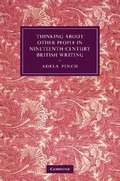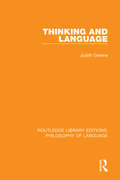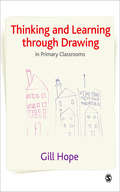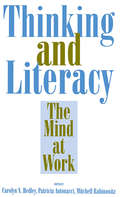- Table View
- List View
Thinking Literature across Continents
by J. Hillis Miller Ranjan GhoshThinking Literature across Continents finds Ranjan Ghosh and J. Hillis Miller--two thinkers from different continents, cultures, training, and critical perspectives--debating and reflecting upon what literature is and why it matters. Ghosh and Miller do not attempt to formulate a joint theory of literature; rather, they allow their different backgrounds and lively disagreements to stimulate generative dialogue on poetry, world literature, pedagogy, and the ethics of literature. Addressing a varied literary context ranging from Victorian literature, Chinese literary criticism and philosophy, and continental philosophy to Sanskrit poetics and modern European literature, Ghosh offers a transnational theory of literature while Miller emphasizes the need to account for what a text says and how it says it. Thinking Literature across Continents highlights two minds continually discovering new paths of communication and two literary and cultural traditions intersecting in productive and compelling ways.
Thinking Past ‘Post-9/11’: Home, Nation and Transnational Desires in Pakistani English Novels and Hindi Films
by Jayana JainThis book offers new ways of constellating the literary and cinematic delineations of Indian and Pakistani Muslim diasporic and migrant trajectories narrated in the two decades after the 9/11 attacks. Focusing on four Pakistani English novels and four Indian Hindi films, it examines the aesthetic complexities of staging the historical nexus of global conflicts and unravels the multiple layers of discourses underlying the notions of diaspora, citizenship, nation and home. It scrutinises the “flirtatious” nature of transnational desires and their role in building glocal safety valves for inclusion and archiving a planetary vision of trauma. It also provides a fresh perspective on the role of Pakistani English novels and mainstream Hindi films in tracing the multiple origins and shifts in national xenophobic practices, and negotiating multiple modalities of political and cultural belonging. It discusses various books and films including The Reluctant Fundamentalist, Burnt Shadows, My Name is Khan, New York, Exit West, Home Fire, AirLift and Tiger Zinda Hai. In light of the twentieth anniversary of 9/11 attacks, current debates on terror, war, paranoid national imaginaries and the suspicion towards migratory movements of refugees, this book makes a significant contribution to the interdisciplinary debates on border controls and human precarity. A crucial work in transnational and diaspora criticism, it will be of great interest to researchers of literature and culture studies, media studies, politics, film studies, and South Asian studies.
Thinking Poetry: Philosophical Approaches to Nineteenth-Century French Poetry
by Joseph AcquistoThis volume of essays seeks to establish a dialogue between poetry and philosophy where each could be said to read the other and announces important new paths for a reinvigorated study of lyric poetry in the decades to come.
Thinking Reading: What every secondary teacher needs to know about reading
by Dianne Murphy James MurphyDespite the efforts of teachers and educators, every year secondary schools across the English-speaking world turn out millions of functionally illiterate leavers. The costs in human misery and in wasted productivity are catastrophic. What can schools do to prevent this situation? In this highly accessible book James and Dianne Murphy combine more than 50 years of experience to provide teachers with a thorough, easy to use introduction to the extensive research on reading and its effects on student achievement. Drawing on the work of experts from around the world, the authors explore how we learn to read, how the many myths and misconceptions around reading developed, and why they continue to persist.Building on these foundations chapters go on to examine how the general secondary school classroom can support all levels of reading more effectively, regardless of subject; how school leaders can ensure that their systems, practices and school culture deliver the very best literacy provision for all students; and what it takes to ensure that a racing intervention aimed at adolescent struggling readers is truly effective. The overall message of this books is one of great optimism: the authors demonstrate that the right of every child to learn to read is entirely achievable if schools employ the best research-driven practice.
Thinking Reading: What every secondary teacher needs to know about reading
by Dianne Murphy James MurphyDespite the efforts of teachers and educators, every year secondary schools across the English-speaking world turn out millions of functionally illiterate leavers. The costs in human misery and in wasted productivity are catastrophic. What can schools do to prevent this situation? In this highly accessible book James and Dianne Murphy combine more than 50 years of experience to provide teachers with a thorough, easy to use introduction to the extensive research on reading and its effects on student achievement. Drawing on the work of experts from around the world, the authors explore how we learn to read, how the many myths and misconceptions around reading developed, and why they continue to persist.Building on these foundations chapters go on to examine how the general secondary school classroom can support all levels of reading more effectively, regardless of subject; how school leaders can ensure that their systems, practices and school culture deliver the very best literacy provision for all students; and what it takes to ensure that a racing intervention aimed at adolescent struggling readers is truly effective. The overall message of this books is one of great optimism: the authors demonstrate that the right of every child to learn to read is entirely achievable if schools employ the best research-driven practice.
Thinking Skills in Higher Education: Pedagogical Practices and Strategies
by S. Mekala M. P. ShabithaThis edited volume illustrates the need for imparting thinking skills in education and workplace training to excel in the 21st century. It deals with the diversity of thinking skills in all domains. It is a valuable resource to understand human cognition and its interaction with human emotion for better social cognition in this digitalized era. This book assists in selecting appropriate thinking skills to be applied in the multitasking environment. It also offers essential strategies to be employed by the learners and teachers for improving thinking skills in the teaching-learning context and the workplace. The book also provides solutions for coping with the cognitive strain evident while performing complex tasks. It comprises six sections. Each section addresses different thinking skills related to social cognition, meta-emotion, meta-thinking, digital thinking, workplace thinking, lateral thinking, innovative thinking, positive activating thinking, thinking skills in language production, achievement motivation and pragmatic thinking. Thinking skills and strategies examined in the chapters are participative, diverse and interconnected, fostering individuals to think collectively to get innovative solutions in complex situations. This book is a valuable resource for Educators, Researchers, Skill Trainers, Strategic Trainers, Trainers of Thinking skills in the corporate sector, and individuals who aspire to be effective thinkers in society.
Thinking Spanish Translation: A Course in Translation Method: Spanish to English (Thinking Translation)
by Michael Thompson Louise Haywood Sándor HerveyThe new edition of this comprehensive course in Spanish-English translation offers advanced students of Spanish a challenging yet practical approach to the acquisition of translation skills, with clear explanations of the theoretical issues involved. A variety of translation issues are addressed, including: cultural differences register and dialect grammatical differences genre. With a sharper focus, clearer definitions and an increased emphasis on up-to-date ‘real world’ translation tasks, this second edition features a wealth of relevant illustrative material taken from a wide range of sources, both Latin American and Spanish, including: technical, scientific and legal texts journalistic and informative texts literary and dramatic texts. Each chapter includes suggestions for classroom discussion and a set of practical exercises designed to explore issues and consolidate skills. Model translations, notes and suggestions for teaching and assessment are provided in a Teachers’ Handbook; this is available for free download at http://www.routledge.com/cw/thinkingtranslation/ Thinking Spanish Translation is essential reading for advanced undergraduate and postgraduate students of Spanish and translation studies. The book will also appeal to a wide range of language students and tutors through the general discussion of the principles and purposes of translation.
Thinking Through Communication
by Sarah TrenholmPraised for its teachability, Thinking Through Communication provides an excellent, balanced introduction to basic theories and principles of communication, making sense of a complex field through a variety of approaches. In an organized and coherent manner, Thinking Through Communication covers a full range of topics- from the history of communication study to the methods used by current communication scholars to understand human interaction. The text explores communication in a variety of traditional contexts: interpersonal, group, organizational, public, intercultural, computer-mediated communication and the mass media. This edition also offers new insights into public speaking and listening. This text can be used successfully in both theory- and skills-based courses. Written in a clear, lively style, Trenholm's overall approach-including her use of examples and interesting illustrations-helps both majors and non-majors alike develop a better understanding of communication as a field of study and an appreciation for ways in which communication impacts their daily lives.
Thinking Through Communication: An Introduction to the Study of Human Communication
by Sarah Trenholm Adam Roth Brenton MalinThis fully updated tenth edition for hybrid introductory communication courses provides a balanced introduction to the fundamental theories and principles of communication.The book explores communication in a variety of contexts, including interpersonal, group, organizational, and mass media. It provides students with the theoretical knowledge and the research and critical thinking skills they will need to succeed in advanced communication courses and professions. Organized into three parts, this new edition first explores the history of communication studies and explains the basic perspectives used by scholars in the field. Part II looks at how language and listening take place in small and large groups. Part III then examines global, institutional, and public communication. This edition includes an additional chapter on research methods, reflects the changing nature and norms of communication in the workplace, and provides a post-COVID assessment of models, methods, and evaluations of telecommuting practices. The appendix gives users the flexibility to tailor their courses to the interests and needs of their students, offering guidelines for preparing and presenting public presentations and giving examples of major research methods.Thinking Through Communication is an ideal textbook for Introduction to Communication courses that aim to provide a comprehensive overview of the field.Material for instructors including PowerPoint slides, test questions, and an instructor’s manual are available at www.routledge.com/9781032499079.
Thinking Through Communication: An Introduction to the Study of Human Communication
by Sarah TrenholmThe ninth edition of this textbook for hybrid introductory communication courses provides a balanced introduction to the fundamental theories and principles of communication. The book explores communication in a variety of contexts—including interpersonal, group, organizational, and mass media—and provides students the theoretical knowledge and the research and critical thinking skills they’ll need to succeed in advanced communication courses and professions. The first section explores the history of communication study and explains basic perspectives used by scholars in the field. The second looks at how communicators decode and encode messages, while the third examines channels and contexts, from interpersonal to mass media. This edition devotes attention to how new technologies are changing the ways we think about communication, with revised and updated examples, and gives special attention to relevant critical theory. Two appendices give users the flexibility to tailor their courses to the interests and needs of their students, offering guidelines for preparing and presenting public presentations and giving examples of major research methods. Thinking Through Communication is an ideal textbook for Introduction to Communication courses that aim to provide a comprehensive overview of the field. A companion website for instructors containing PowerPoint slides, test questions, and an instructor’s manual is available at https://routledgetextbooks.com/textbooks/9780367857011.
Thinking Through Communication: An Introduction to the Study of Human Communication (Mycommunicationkit Ser.)
by Sarah TrenholmNow in its eighth edition, Thinking Through Communication provides a balanced introduction to the fundamental theories and principles of communication. It explores communication in a variety of contexts—from interpersonal to group to mass media—and can be used in both theoryand skills-based courses. With a dynamic approach, Trenholm helps students to develop a better understanding of communication as a field of study, as well as its practical applications. This edition devotes attention to how new technologies are changing the ways we think about communication, with revised chapters on both traditional and social media.
Thinking Through Crisis: Depression-Era Black Literature, Theory, and Politics (Commonalities)
by James Edward Ford IIIWinner, 2020 William Sanders Scarborough Prize, Modern Language AssociationHonorable Mention, MSA First Book PrizeIn Thinking Through Crisis, James Edward Ford III examines the works of Richard Wright, Ida B. Wells, W. E. B. Du Bois, Zora Neale Hurston, and Langston Hughes during the 1930s in order to articulate a materialist theory of trauma. Ford highlights the dark proletariat’s emergence from the multitude apposite to white supremacist agendas. In these works, Ford argues, proletarian, modernist, and surrealist aesthetics transform fugitive slaves, sharecroppers, leased convicts, levee workers, and activist intellectuals into protagonists of anti-racist and anti-capitalist movements in the United States.Thinking Through Crisis intervenes in debates on the 1930s, radical subjectivity, and states of emergency. It will be of interest to scholars of American literature, African American literature, proletarian literature, black studies, trauma theory, and political theory.
Thinking Through Questions: A Concise Invitation to Critical, Expansive, and Philosophical Inquiry
by Anthony Weston Stephen Bloch-SchulmanThinking Through Questions is an accessible and compact guide to the art of questioning, covering both the use and abuse of questions. Animated by wide-ranging and engaging exercises and examples, the book helps students deepen their understanding of how questions work and what questions do, and builds the skills needed to ask better questions. Cowritten by two of today's leading philosopher-teachers, Thinking Through Questions is specifically designed to complement, connect, and motivate today&’s standard curricula, especially for classes in critical thinking, philosophical questioning, and creative problem- solving (called here "expansive questioning"). Offering students a wide and appreciative look at questions and questioning, this small book will also appeal to faculty and students across the disciplines: in college writing courses, creativity workshops, education schools, introductions to college thinking, design thinking projects, and humanities and thinking classes. Open-ended, creative, and critically self-possessed thinking is its constant theme—what field doesn&’t need more of that?
Thinking Through Translation with Metaphors
by James St. AndréThinking through Translation with Metaphors explores a wide range of metaphorical figures used to describe the translation process, from Aristotle to the present. Most practitioners and theorists of translation are familiar with a number of metaphors for translation, such as the metaphor of the bridge, following in another's footsteps, performing a musical score, changing clothes, or painting a portrait; yet relatively little attention has been paid to what these metaphorical models reveal about how we conceptualize translation. Drawing on insights from recent developments in metaphor theory, contributors to this volume reveal how central metaphorical language has been to translation studies at all periods of time and in various cultures. Metaphors have played a key role in shaping the way in which we understand translation, determining what facets of the translation process are deemed to be important and therefore merit study, and aiding in the training of successive generations of translators and theorists. While some of the papers focus mainly on past metaphorical representations, others discuss recent shifts in both metaphor and translation theory, while others still propose innovative metaphors in a bid to transform translation studies. The volume also includes an annotated bibliography of works centrally concerned with metaphors of translation.
Thinking Together: Lecturing, Learning, and Difference in the Long Nineteenth Century (Rhetoric and Democratic Deliberation #16)
by Angela G. Ray Paul StobChanges to the landscape of higher education in the United States over the past decades have urged scholars grappling with issues of privilege, inequality, and social immobility to think differently about how we learn and deliberate. Thinking Together is a multidisciplinary conversation about how people approached similar questions of learning and difference in the nineteenth century.In the open air, in homes, in public halls, and even in prisons, people pondered recurring issues: justice, equality, careers, entertainment, war and peace, life and death, heaven and hell, the role of education, and the nature of humanity itself. Paying special attention to the dynamics of race and gender in intellectual settings, the contributors to this volume consider how myriad groups and individuals—many of whom lived on the margins of society and had limited access to formal education—developed and deployed knowledge useful for public participation and public advocacy around these concerns. Essays examine examples such as the women and men who engaged lecture culture during the Civil War; Irish immigrants who gathered to assess their relationship to the politics and society of the New World; African American women and men who used music and theater to challenge the white gaze; and settler-colonists in Liberia who created forums for envisioning a new existence in Africa and their relationship to a U.S. homeland. Taken together, this interdisciplinary exploration shows how learning functioned not only as an instrument for public action but also as a way to forge meaningful ties with others and to affirm the value of an intellectual life.By highlighting people, places, and purposes that diversified public discourse, Thinking Together offers scholars across the humanities new insights and perspectives on how difference enhances the human project of thinking together.
Thinking Unrest: The Unsettled Legacy of German Idealism (SUNY series, Intersections: Philosophy and Critical Theory)
by Kristina MendicinoReconsiders major thinkers and works of German Idealism and their legacy for our own restless times.From the longing in which Schelling based human freedom to the "restlessness of the negative" that Jean-Luc Nancy famously traced through Hegel's corpus, unrest centrally preoccupied many thinkers associated with German Idealism. Thinking Unrest gathers original essays from eight leading scholars to reopen the question of what moves thought both within German Idealism and among the movement’s heirs. Through readings of Fichte, Hegel, Hölderlin, Novalis, and Schelling, as well as more contemporary writers such as Nicolas Abraham, Ernst Bloch, Antonio Gramsci, and Rainer Maria Rilke, contributors expose more broadly what it may mean for philosophy to be a matter of responding to that which provokes, troubles, and withdraws from thought. Drawing on various theoretical perspectives—poststructuralism, psychoanalysis, the history of science, political theory—the volume reconsiders the legacy of German Idealism for thinking unrest today.
Thinking Veganism in Literature and Culture: Towards A Vegan Theory (Palgrave Studies in Animals and Literature)
by Emelia Quinn Benjamin WestwoodThis collection explores what the social and philosophical aspects of veganism offer to critical theory. Bringing together leading and emerging scholars working in animal studies and critical animal studies, Thinking Veganism in Literature and Culture shows how the experience of being vegan, and the conditions of thought fostered by veganism, pose new questions for work across multiple disciplines. Offering accounts of veganism which move beyond contemporary conceptualizations of it as a faddish dietary preference or set of proscriptions, it explores the messiness and necessary contradictions involved in thinking about or practicing a vegan way of life. By thinking through as well as about veganism, the project establishes the value of a vegan mode of reading, writing, looking, and thinking.
Thinking While Black: Translating the Politics and Popular Culture of a Rebel Generation
by Daniel McNeilThinking While Black brings together the work and ideas of the most notorious film critic in America, one of the most influential intellectuals in the United Kingdom, and a political and cultural generation that consumed images of rebellion and revolution around the world as young Black teenagers in the late 1960s. Drawing on hidden and little known archives of resistance and resilience, it sheds new light on the politics and poetics of young people who came together, often outside of conventional politics, to rock against racism in the 1970s and early ‘80s. It re-examines debates in the 1980s and ‘90s about artists who “spread out” to mount aggressive challenges to a straight, white, middle-class world, and entertainers who “sold out” to build their global brands with performances that attacked the Black poor, rejected public displays of introspection, and expressed unambiguous misogyny and homophobia. Finally, it thinks with and through the work of writers who have been celebrated and condemned as eminent intellectuals and curmudgeonly contrarians in the twenty-first century. In doing so, it delivers the smartest and most nuanced investigation into thinkers such as Paul Gilroy and Armond White as they have evolved from “young soul rebels” to “middle-aged mavericks” and “grumpy old men,” lamented the debasement and deskilling of Black film and music in a digital age, railed against the discourteous discourse and groupthink of screenies and Internet Hordes, and sought to stimulate some deeper and fresher thinking about racism, nationalism, multiculturalism, political correctness and social media. Listen along with this Spotify playlist inspired by the book! For copyright reasons, this book is available in the U.S.A only.
Thinking Write
by Kelly L. StoneWriter's block. Creative freeze. Artistic burnout. In this book, professional counselor Kelly L. Stone teaches you how to use the power of the subconscious mind to capitalize on your writing sessions. Proven techniques for accessing this hidden tool are revealed with a mix of anecdotes, exercises, and guided meditations. You will hear from well-known and award-winning authors such as Jacquelyn Mitchard and Stephanie Lossee and how they utilize these methods. Writers--both professional and aspiring--will take away: A working understanding of the subconscious mind and its benefits to writers Practical techniques for developing a bridge to the subconscious mind Easy-to-use strategies for using the power of the subconscious mind to assist with writing endeavors and become successful as a writer Proven psychological methods for building self-confidence as a writer This book will have you putting pen to paper in no time! The e-book version of this title does not include a CD.
Thinking Write
by Kelly L. StoneWriter's block. Creative freeze.Artistic burnout.In this book, professional counselor Kelly L. Stone teaches you how to use the power of the subconscious mind to capitalize on your writing sessions. Proven techniques for accessing this hidden tool are revealed with a mix of anecdotes, exercises, and guided meditations. You will hear from well-known and award-winning authors such as Jacquelyn Mitchard and Stephanie Lossee and how they utilize these methods. Writers--both professional and aspiring--will take away:A working understanding of the subconscious mind and its benefits to writersPractical techniques for developing a bridge to the subconscious mindEasy-to-use strategies for using the power of the subconscious mind to assist with writing endeavors and become successful as a writerProven psychological methods for building self-confidence as a writerAs a bonus, the book includes an instructive CD with guided meditations specifically for writers. The exercises on the CD bolster the material in the book and will have you putting pen to paper in no time!
Thinking about Content Reading
by Kylene BeersThis book is designed to help you read your social studies books. It contains activities that will help you learn how to focus on important information and discover meaning as you read. This book has the following three parts: * Reading Skills * Think-Alouds * Graphic Organizers Each part focuses on specific skills or strategies you can use to improve your reading.
Thinking about Other People in Nineteenth-Century British Writing
by Adela PinchNineteenth-century life and literature are full of strange accounts that describe the act of one person thinking about another as an ethically problematic, sometimes even a dangerously powerful thing to do. Adela Pinch explains why, when, and under what conditions it is possible, or desirable, to believe that thinking about another person could affect them. She explains why nineteenth century British writers - poets, novelists, philosophers, psychologists, devotees of the occult - were both attracted to and repulsed by radical or substantial notions of purely mental relations between persons, and why they moralized about the practice of thinking about other people in interesting ways. Working at the intersection of literary studies and philosophy, this book both sheds new light on a neglected aspect of Victorian literature and thought, and explores the consequences of, and the value placed on, this strand of thinking about thinking.
Thinking and Language: Topics In Cognitive Psychology (New Essential Psychology Ser.)
by Judith GreeneOriginally published in 1875, this book discusses thinking and language and traces the development of different pscyological approaches, assessing their theoretical significance and the experimental evidence behind them. It ends by drawing together the various lines of argument to arrive at some general conclusions about language and thought, since it clearly emerges that the two are inextricably linked.
Thinking and Learning Through Drawing: In Primary Classrooms
by Mrs Gill Hope'The text is clear and accessible and gives a fascinating overview of how drawing can help children to learn and understand the thinking of others...It is highly recommended for all students and practitioners interested in understanding more about how children express their ideas and theories about the world' - Early Years Update 'This book is an invaluable resource for anyone who recognises the potential of 'drawing' as an essential element for developing thinking and learning in the Primary Classroom...and a 'must read' for those who are sceptical!....This is a fascinating read that invokes a variety of feelings including a sense of wonder and curiosity about the many facets of drawing, which leaves you with a thirst to try out more and explore ways of releasing the untapped potential of 'drawing' in your own classroom' - thinkingclassroom.co.uk Children use drawing as a means through which they create, develop, communicate and record their thoughts and ideas. Whether it's to play, or to express feelings and meaning, drawing enables them to learn about the world, explore their imaginations, and to invent and present new ideas. With an extensive background in teaching and researching children's uses of drawing, Gill Hope describes the ways in which multiple forms of drawing are used by Primary school children. She explains why it should be actively promoted as a means of supporting thinking and learning across a wide range of subject areas, and provides practical support for teachers. Demonstrating the importance of drawing, and combining a thematic approach with practical guidance, this informative and enjoyable book: - widens teachers' understanding of the multiple uses of drawing; - shows how children can be guided to use it to support thinking and learning; - explores the range of applications in which drawing can be used across all areas of the curriculum; - looks to the future and at the ever increasing importance of graphic literacy. Providing a fresh insight into the uses of drawing as a powerful tool which supports children's thinking and learning, this book will be of interest to everyone involved in the development of children's capabilities, including teachers, student teachers and teaching assistants.
Thinking and Literacy: The Mind at Work
by N. Hedley Carolyn Antonacci Patricia Rabinowitz MitchellThis volume explores higher level, critical, and creative thinking, as well as reflective decision making and problem solving -- what teachers should emphasize when teaching literacy across the curriculum. Focusing on how to encourage learners to become independent thinking, learning, and communicating participants in home, school, and community environments, this book is concerned with integrated learning in a curriculum of inclusion. It emphasizes how to provide a curriculum for students where they are socially interactive, personally reflective, and academically informed. Contributors are authorities on such topics as cognition and learning, classroom climates, knowledge bases of the curriculum, the use of technology, strategic reading and learning, imagery and analogy as a source of creative thinking, the nature of motivation, the affective domain in learning, cognitive apprenticeships, conceptual development across the disciplines, thinking through the use of literature, the impact of the media on thinking, the nature of the new classroom, developing the ability to read words, the bilingual, multicultural learner, crosscultural literacy, and reaching the special learner. The applications of higher level thought to classroom contexts and materials are provided, so that experienced teacher educators, and psychologists are able to implement some of the abstractions that are frequently dealt with in texts on cognition. Theoretical constructs are grounded in educational experience, giving the volume a practical dimension. Finally, appropriate concerns regarding the new media, hypertext, bilingualism, and multiculturalism as they reflect variation in cognitive experience within the contexts of learning are presented.
